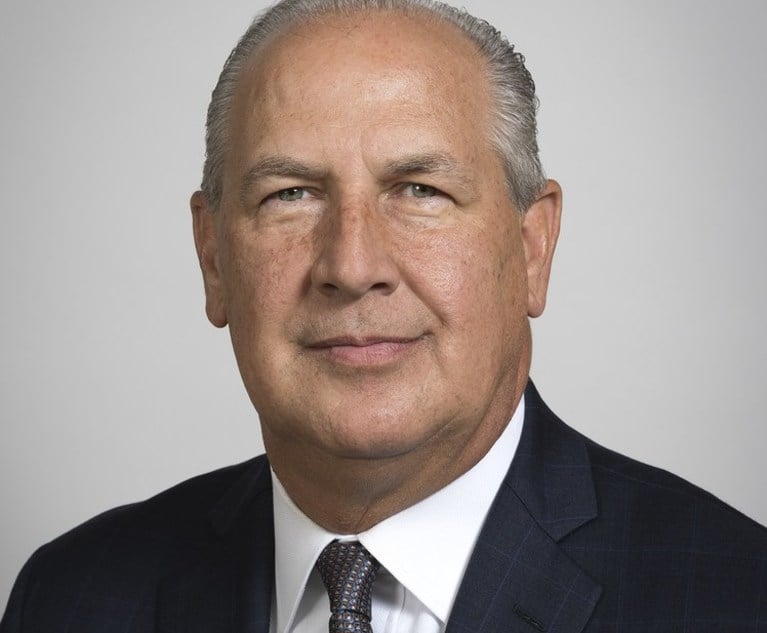Summer Associates Are Happier Than Ever, but Pa. Firms Get Mixed Reviews
Aspiring lawyers know what they want, and they're getting it, for the most part, according to our annual survey.
September 27, 2018 at 03:00 PM
9 minute read
The original version of this story was published on The American Lawyer

Summer associates have been, on average, thrilled with their experiences in Big Law this year, but not all Pennsylvania firms received high marks.
The 2018 class of aspiring young lawyers gave an average satisfaction score of 4.768 out of 5, a survey by The American Lawyer and ALM Legal Intelligence found. None of the 85 firms ranked earned an average score of less than 4.3. (See the full list at the end of this story.)
The summer associates' most memorable moments, as described in open-ended answers, show that a number of law students were making meaningful contributions on deal teams and in litigation, while also fully enjoying high-end social excursions like Taylor Swift concerts, Broadway plays, professional sports games and retreats in far-flung offices.
The ranking of firms by summer associate satisfaction showed a shake-up, with seven firms in the top 10 that were not there last year. Firms were ranked by their average scores based on nine categories: interesting work, real work, training and guidance, partner-summer associate interaction, associate-summer associate interaction, communication of goals and expectations, accuracy of firm self-portrayal, inclination to accept full-time associateship and overall rating as a place to work.
➤ Related Coverage: What's Average Summer Associate Pay?
White & Case, with a perfect average score of 5.0, was the top-ranked firm, hopping up from eighth in 2017 and taking the place of Philadelphia-based Duane Morris and Boston-based Foley Hoag, which tied for first last year. Duane Morris stayed in the top 10 at No. 6, and Foley Hoag had just eight survey participants, so it was not ranked nationally.
Kramer Levin Naftalis & Frankel was second, and Paul Hastings was third, jumping up from 11th and 16th, respectively. The most dramatic changes among the top 10 firms were at Willkie Farr & Gallagher, which went from 49th to fourth, and Baker McKenzie, which went from 37th to ninth. Summers at those two firms praised the amount of substantive work they were given and the friendliness of lawyers at the firm, and a few noted that work-life balance was better than they expected, particularly at Baker McKenzie.
Other firms in the top 10 were Clifford Chance (fifth), Dechert (seventh), Akin Gump Strauss Hauer & Feld (eighth) and Blank Rome (ninth, tied with Baker McKenzie).
Both Dechert and Blank Rome moved into the top 10 from further down the list. Last year, Dechert ranked 19th and Blank Rome ranked 13th.
The 2017 top 10 firm with the biggest change in its ranking was Arnold & Porter Kaye Scholer, which went from No. 3 to No. 44. Still, the firm had an average satisfaction score of 4.748. In their open-ended survey responses, Arnold & Porter Kaye Scholer summer associates' most common criticism was of the firm's assignment system, which one described as “rigid.”
In a statement, a spokeswoman for Arnold & Porter said the firm puts a two-week limit on summer associate assignments “to allow and encourage each summer associate to work on projects with a number of different lawyers and clients during the course of the summer.”
“In our experience, an approach such as this not only helps the summer associate become acquainted with the diversity of our practitioners and their varied working styles, it also enables the firm to accumulate a broadly balanced and reliable assessment of the summer associate's capabilities,” the firm said.
The lowest-ranked firm on the list was Philadelphia-based Drinker, Biddle & Reath, which dropped 23 places since last year. It was the only firm whose average scores for interesting work and real work dipped below 4.
Drinker Biddle hiring partner Justin Kay notes that in the firm's own internal summer associate survey, most respondents said their work was interesting, while just one individual said it was “dull with some high points.” And he says the firm's use of training modules for summer associates, while they are decidedly not “real work,” are an integral part of the program, giving young lawyers exposure to practice areas where they would otherwise be unable to gain experience.
“That's by design, and I think it really sets us apart,” Kay says. “Speaking globally, the fact that the lowest score is a 4.379 shows that big law firms are doing a really good job running their summer programs.”
Results varied for the rest of the Pennsylvania firms on the list. Ballard Spahr moved up from the 89th spot in 2017 to the 26th spot this year. But Morgan, Lewis & Bockius dropped from 17th to 23rd, Fox Rothschild dropped from 38th to 53rd and Reed Smith dropped from 54th to 57th.
Pepper Hamilton, meanwhile, stayed relatively steady, moving from 45th to 46th.
While respondents across the country generally expressed very positive views of their summer experiences, they also did not shy away from saying what they want in a workplace. That occasionally came out in a kudos to their firm for work-life balance or diversity efforts, but more often as a push on their firms to make further improvements in those areas.
Making Balance Mainstream
Aspiring lawyers want to have a life outside of work, and they don't want to hide it.
Work-life balance has become important to more summer associates than any other factor in evaluating their job offers. When asked what factors they would consider, 47.6 percent said work-life balance, up 3 percent from last year. Interestingly, however, the percentage of summer associates giving “relaxed office” as a factor in evaluating offers dropped considerably, from 25.1 percent to 20.7 percent, suggesting that they are content to work in a more formal environment if it means they can have a life outside of the job.
Summer associates' views on what they actually observed were mixed. Numerous survey respondents said in open-ended answers that they were surprised by the work-life balance their firms afforded, or by the number of lawyers who worked reasonable hours at the office.
But some say their firms could do more to encourage the use of flexible arrangements or criticize the expectations they were held to.
“There is no work-life balance, and the attorneys who succeed are ones who are single or who have stay-at-home wives,” a summer associate in Charlotte says.
Others are critical of the vast number of social events they were expected to attend as a summer associate, complaining that those obligations, while fun, took away from their ability to recharge off the clock, or worse, to get their work done.
And they want their firms to be upfront about flexible work options.
“Proactively make working from home less taboo and more mainstream,” a San Francisco respondent notes. “It's 2018 and working from home (within reason) should not be that big of a deal. It also demonstrates trust in associates and a greater sense of autonomy.”
Managing Expectations
Also in the spirit of openness, summers ask that their firms be more upfront about whether a job would be waiting for them at the end of the season and which practice areas would be hiring.
“I would like them to be more clear about when to expect job offers, if ever. Perhaps give us a date when we can expect to be told 'yes' or 'no,'” a summer associate in Atlanta says. “As it stands, I expect to hear about it at any moment, but other opportunities for [on-campus interviews] at school are coming and going, and I don't know whether to pursue those opportunities or not.”
Still, the number of summers unsure of whether they will receive an offer decreased slightly, to 8.2 percent, and 84.9 percent said they are expecting to receive an offer.
Despite their gripes about offer uncertainty, another 8 percent of summer associates had already been offered a job when they answered the survey, showing an increase from 6.4 percent last year.
Diversity, Not Excuses
It's not difficult for summer associates to see whether their firms' diversity efforts are working. All it takes is a look around.
“I would tell the firm that diversity in top law schools already exists,” one New York summer says. “The firm needs to be more focused and aggressive in its recruitment of these people.”
Another summer associate says the lack of diversity in their firm's Wilmington, Delaware, office “makes the few [people of color] who are in the office feel like this isn't a space they belong in.”
When asked what they would consider in evaluating a job offer, 10.7 percent of survey respondents said diversity was an important factor, up from 8.8 percent last year.
And 6.7 percent say an above-average proportion of female partners was an important consideration, up slightly from 5.9 percent last year.
Many survey respondents, in their open-ended answers, urged their firms to continue or strengthen their efforts toward diversifying their firm and its leadership.
One summer associate in Boston, acknowledging that their firm was making an effort to be more diverse, called out the legal industry at large.
“My goodness does Big Law need to do so, so, so much more. It was a really unpleasant shock to look around the room on the first day and see that a law firm with a good reputation and a strong stated commitment to diversity had such a white and male summer class. And then you scroll through the firm's website and see everyone's pictures and it's just really discouraging,” the Boston associate says.
This content has been archived. It is available through our partners, LexisNexis® and Bloomberg Law.
To view this content, please continue to their sites.
Not a Lexis Subscriber?
Subscribe Now
Not a Bloomberg Law Subscriber?
Subscribe Now
NOT FOR REPRINT
© 2025 ALM Global, LLC, All Rights Reserved. Request academic re-use from www.copyright.com. All other uses, submit a request to [email protected]. For more information visit Asset & Logo Licensing.
You Might Like
View All
Trump RTO Mandates Won’t Disrupt Big Law Policies—But Client Expectations Might
6 minute read
Kirkland Lands in Phila., but Rate Pressure May Limit the High-Flying Firm's Growth Prospects
5 minute read
Montgomery McCracken Touts 'Record' Financial Performance Despite Shrinking Head Count
6 minute readTrending Stories
- 1We the People?
- 2New York-Based Skadden Team Joins White & Case Group in Mexico City for Citigroup Demerger
- 3No Two Wildfires Alike: Lawyers Take Different Legal Strategies in California
- 4Poop-Themed Dog Toy OK as Parody, but Still Tarnished Jack Daniel’s Brand, Court Says
- 5Meet the New President of NY's Association of Trial Court Jurists
Who Got The Work
J. Brugh Lower of Gibbons has entered an appearance for industrial equipment supplier Devco Corporation in a pending trademark infringement lawsuit. The suit, accusing the defendant of selling knock-off Graco products, was filed Dec. 18 in New Jersey District Court by Rivkin Radler on behalf of Graco Inc. and Graco Minnesota. The case, assigned to U.S. District Judge Zahid N. Quraishi, is 3:24-cv-11294, Graco Inc. et al v. Devco Corporation.
Who Got The Work
Rebecca Maller-Stein and Kent A. Yalowitz of Arnold & Porter Kaye Scholer have entered their appearances for Hanaco Venture Capital and its executives, Lior Prosor and David Frankel, in a pending securities lawsuit. The action, filed on Dec. 24 in New York Southern District Court by Zell, Aron & Co. on behalf of Goldeneye Advisors, accuses the defendants of negligently and fraudulently managing the plaintiff's $1 million investment. The case, assigned to U.S. District Judge Vernon S. Broderick, is 1:24-cv-09918, Goldeneye Advisors, LLC v. Hanaco Venture Capital, Ltd. et al.
Who Got The Work
Attorneys from A&O Shearman has stepped in as defense counsel for Toronto-Dominion Bank and other defendants in a pending securities class action. The suit, filed Dec. 11 in New York Southern District Court by Bleichmar Fonti & Auld, accuses the defendants of concealing the bank's 'pervasive' deficiencies in regards to its compliance with the Bank Secrecy Act and the quality of its anti-money laundering controls. The case, assigned to U.S. District Judge Arun Subramanian, is 1:24-cv-09445, Gonzalez v. The Toronto-Dominion Bank et al.
Who Got The Work
Crown Castle International, a Pennsylvania company providing shared communications infrastructure, has turned to Luke D. Wolf of Gordon Rees Scully Mansukhani to fend off a pending breach-of-contract lawsuit. The court action, filed Nov. 25 in Michigan Eastern District Court by Hooper Hathaway PC on behalf of The Town Residences LLC, accuses Crown Castle of failing to transfer approximately $30,000 in utility payments from T-Mobile in breach of a roof-top lease and assignment agreement. The case, assigned to U.S. District Judge Susan K. Declercq, is 2:24-cv-13131, The Town Residences LLC v. T-Mobile US, Inc. et al.
Who Got The Work
Wilfred P. Coronato and Daniel M. Schwartz of McCarter & English have stepped in as defense counsel to Electrolux Home Products Inc. in a pending product liability lawsuit. The court action, filed Nov. 26 in New York Eastern District Court by Poulos Lopiccolo PC and Nagel Rice LLP on behalf of David Stern, alleges that the defendant's refrigerators’ drawers and shelving repeatedly break and fall apart within months after purchase. The case, assigned to U.S. District Judge Joan M. Azrack, is 2:24-cv-08204, Stern v. Electrolux Home Products, Inc.
Featured Firms
Law Offices of Gary Martin Hays & Associates, P.C.
(470) 294-1674
Law Offices of Mark E. Salomone
(857) 444-6468
Smith & Hassler
(713) 739-1250






